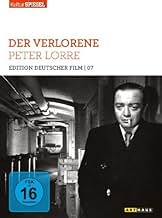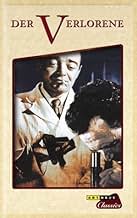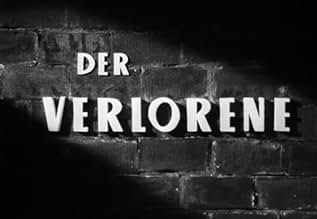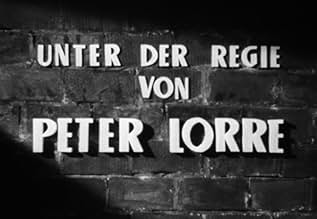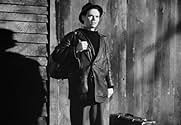NOTE IMDb
7,0/10
1,2 k
MA NOTE
Pendant la seconde guerre mondiale, un scientifique allemand décide de tuer sa fiancée lorsqu'il apprend qu'elle a livré ses secrets à l'ennemi.Pendant la seconde guerre mondiale, un scientifique allemand décide de tuer sa fiancée lorsqu'il apprend qu'elle a livré ses secrets à l'ennemi.Pendant la seconde guerre mondiale, un scientifique allemand décide de tuer sa fiancée lorsqu'il apprend qu'elle a livré ses secrets à l'ennemi.
- Réalisation
- Scénario
- Casting principal
- Récompenses
- 1 victoire et 1 nomination au total
Helmuth Rudolph
- Colonel Winkler
- (as Helmut Rudolph)
Eva Ingeborg Scholz
- Ursula Weber
- (as Eva-Ingeborg Scholz)
Peter Ahrweiler
- Oberstleutnant Marquardt
- (non crédité)
Josef Dahmen
- Lieske, canteen bartender
- (non crédité)
Helmut Eichberg
- Oberstleutnant Bydersahn
- (non crédité)
Kurt Fuß
- Baldheaded Man
- (non crédité)
Joachim Hess
- Leutnant
- (non crédité)
Richard Münch
- Criminal Inspector #1
- (non crédité)
Avis à la une
This is probably a good movie, but it's hard to tell because at many key moments throughout the movie it is difficult to read the subtitles. Because the movie is in black and white, white subtitles keep showing up on white background and so, unless you understand German, you only catch snatches of important conversations. This is particularly a problem in the last fifth of the movie that involves a scene in a large house where a plot to kill Hitler is being hatched (I think). What that had to do with Dr. Rothe (the Peter Lorre character) killing his fiancee and his subsequent choice about which Nazi to shoot I have yet to figure out. After the movie, I asked total strangers in the audience what was going on in that house and they didn't know either.
I suggest that any distributor who is looking to make some money from this movie should consider producing a new edition with yellow subtitles that will stand out on both black and white backgrounds. Without those, this will remain a movie that is well-known only in Germany.
I suggest that any distributor who is looking to make some money from this movie should consider producing a new edition with yellow subtitles that will stand out on both black and white backgrounds. Without those, this will remain a movie that is well-known only in Germany.
DER VERLORENE is one of these films that at first seemed to me very confusing and brought me the sensation "i am not following...".I rated it 8 out of 10 mainly because of the wonderful film-noir atmosphere,the black and white photograph,the very well filmed scenes on the streets of "old" Hamburg and ,above all,the extraordinary last minutes.
Then,time passed and months later ,i still have that strange feeling in my mind ,i have been dreaming with that loneness and absurd madness of the main character-the doctor played by Peter Lorre.So i decided to include DER VERLORENE amongst my personal list of best films ever and change my vote to 10 out of 10.
Sometimes a good work of art takes its necessary time to mature as a good wine!.In my humble opinion that is the case of this film.
Then,time passed and months later ,i still have that strange feeling in my mind ,i have been dreaming with that loneness and absurd madness of the main character-the doctor played by Peter Lorre.So i decided to include DER VERLORENE amongst my personal list of best films ever and change my vote to 10 out of 10.
Sometimes a good work of art takes its necessary time to mature as a good wine!.In my humble opinion that is the case of this film.
Following a period of rehabilitation where he managed to beat his addiction to morphine, character actor extraordinaire Peter Lorre felt confident enough not only to leave his secure employment as a lean, sleek villain in myriad Hollywood noirs and go back to his native Germany after almost 20 years (which, like many compatriots, he had fled when the Nazis came to power) but also to embark on his sole foray behind the camera. Adopting an unfussy technique but a compelling flashback structure, Lorre turned out a truly remarkable piece of work that, equally unsuccessful on its first release as Charles Laughton's THE NIGHT OF THE HUNTER (1955) and Marlon Brando's ONE-EYED JACKS (1961), has yet to have its somewhat maligned reputation vindicated in the same unequivocal manner as these two 'one-hit wonders' by actors-turned-directors. A chubbier, infinitely world-weary Lorre gives a haunting central performance as the dedicated, real-life scientist Dr. Karl Rothe who, being told by his superiors that his discoveries were being passed on to the allied forces by his beautiful (and much younger) fiancée, strangles her in a moment of silent rage upon returning to the lodgings he shares with his mother-on-law and her cat; the actress playing Lorre's first victim (Renate Mannhardt) makes such an indelible impression on the spectator that, upon a second viewing, one is surprised to discover how brief her appearance in the film actually is. Changing his identity and now serving as a medical doctor in a refugee camp, Lorre is brought once again face to face with his inner demons in the shape of his assistant during WWII who, apart from having carried on an affair with Lorre's wife, was secretly also an important Party official investigating the infamous "Night Of The Long Knives" conspiracy (which is rather murkily dealt with in the film's latter stages); another enigmatic aspect of Lorre's personality that is somewhat oddly thrown into the mix is his troubled dealings with other women over the years, culminating in another murder committed in a stationary train carriage. Interestingly, the film opens with a shot of a moving train out of which emerges the tiny figure of Lorre walking towards the refugee camp and ends in a devastating medium shot of Lorre, one hand clasped dejectedly to his face, standing stationary on the railroad tracks as a locomotive rushes headlong in his direction! As one can surmise from this synopsis, THE LOST ONE's lack of critical and commercial success ought to be attributed more to its utter grimness and thoroughly defeatist view of post-war Germany than to any jinx the production might have been vested with (the film's producer, Arnold Pressburger, died in mid-production, the original negative was lost in an editing suite fire and the film survives via a reconstructed print, etc.) and, indeed, should be much better known even among film connoisseurs. Personally, I had first come across a copy of the film at a priceless DVD rental store on Santa Monica Blvd. in Hollywood in January 2006 but I have since added it to my collection in a seemingly restored version (albeit sporting distractingly ungrammatical English subtitles).
10pyamada
Lorre, perhaps like Charles Laughton, had only this chance to direct. Like Laughton, Lorre made an excellent film, and encountered no problems whatsoever concerning complete control of the film, unlike Laughton, whose film was given a crude ending as a gift from the studio. This is a beautiful, poetic movie about horrible subjects, and the complicated reactions and perspectives one will have about these characters, especially Lorre's, teaches us much about Germany, the Nazis and aspects of the war in general. While there are passing similarities in content to Wilder's A Foreign Affair, Die Verlorne is so much the better movie, so much more poetic (perhaps than anything Wilder ever did), and so moving, in brutal ways, that it just has to be considered one of the best and most powerful and most depressing films ever made.
After eighteen years in exile Peter Lorre returned to the land of his birth for his one and only stab at directing. Based upon a newspaper article about a doctor who had killed his assistant and then stepped in front of a train, Lorre has fashioned a screenplay with the help of novelist Benno Vigny and esteemed director Helmut Kautner.
Like so many actors who take up directing he is very generous to his players and in particular allows his five actresses to shine. Individual scenes are extremely effective but these alas are achieved at the expense of overall structure. Despite oodles of atmosphere from superlative lighting cameraman Vaclav Vich, the film is weakened by a verbose script and an intrusive, over-orchestrated score. Suffice to say Lorre is riveting as Dr. Rothe but the entire enterprise required a firmer hand at the helm.
This is a film that Lorre evidently felt compelled to make but this bleak allegory of Germany's fatal flirtation with National Socialism and the nation's collective guilt in the person of a serial murderer was hardly likey to be welcomed by audiences of the time and such proved to be case.
That it has a haunting quality is undeniable and remains, in the words of David Thomson, "a direct imprint of a very troubled soul."
Like so many actors who take up directing he is very generous to his players and in particular allows his five actresses to shine. Individual scenes are extremely effective but these alas are achieved at the expense of overall structure. Despite oodles of atmosphere from superlative lighting cameraman Vaclav Vich, the film is weakened by a verbose script and an intrusive, over-orchestrated score. Suffice to say Lorre is riveting as Dr. Rothe but the entire enterprise required a firmer hand at the helm.
This is a film that Lorre evidently felt compelled to make but this bleak allegory of Germany's fatal flirtation with National Socialism and the nation's collective guilt in the person of a serial murderer was hardly likey to be welcomed by audiences of the time and such proved to be case.
That it has a haunting quality is undeniable and remains, in the words of David Thomson, "a direct imprint of a very troubled soul."
Le saviez-vous
- AnecdotesPeter Lorre's only film as director
- Crédits fousExplanatory caption (in German) in opening credits: This film is not a work of fiction. The events are based on factual reports from the last few years.
- Versions alternativesThere is an Italian edition of this film on DVD, distributed by DNA srl, "UN UOMO PERDUTO (1951) + CRIME AND PUNISHMENT (Ho ucciso!, 1935)" (2 Films on a single DVD), re-edited with the contribution of film historian Riccardo Cusin. This version is also available for streaming on some platforms.
- ConnexionsFeatured in Displaced Person - Peter Lorre und sein Film 'Der Verlorene' (2007)
Meilleurs choix
Connectez-vous pour évaluer et suivre la liste de favoris afin de recevoir des recommandations personnalisées
Détails
- Durée
- 1h 38min(98 min)
- Couleur
- Mixage
- Rapport de forme
- 1.37 : 1
Contribuer à cette page
Suggérer une modification ou ajouter du contenu manquant

